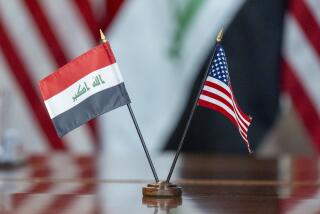Iraq Rockets Bathed U.S. Troops in Chemicals, Senator Reports
- Share via
WASHINGTON — U.S. troops were directly exposed to chemical agents, mostly from rocket attacks, on more than a dozen occasions during the Gulf War, a congressional report claims in concluding that such agents are a cause of illnesses afflicting thousands of veterans.
The 160-page report, to be released today by Sen. Donald W. Riegle Jr. (D-Mich.), includes testimony from 30 Gulf War veterans who say that apparent Iraqi missile attacks were followed by chemical agent detectors sounding, the air filling with fumes and burning sensations on their skin.
Almost all now suffer from the debilitating symptoms of what has come to be known as Persian Gulf Syndrome.
Riegle, chairman of the Senate Banking Committee, holds hearings today with Pentagon and intelligence agency officials on the report. Defense officials say there is no evidence of Iraqi chemical or biological attacks.
The report concludes that, despite Pentagon claims to the contrary, “there is substantial evidence supporting claims that U.S. servicemen and women were exposed to low-level chemical warfare agents and possibly biological agents and toxins from a variety of sources.”
Riegle said his yearlong investigation included interviews with 600 American troops, many of whom corroborated reports of chemical exposures.
One soldier stationed in Saudi Arabia reported a loud explosion early in the morning of Jan. 17, 1991, followed by a sounding of alarms and a burning sensation on his face.
Two days later in another part of Saudi Arabia, witnesses reported a sharp odor of ammonia after a “real bad explosion” and more alarms going off.
A soldier based near King Fahd International Airport on Jan. 20, 1991, said he saw what he believed to be a Scud missile shot down by a Patriot missile. He experienced “a very strong raunchy taste, like very bitter burnt toast” in his mouth. He now suffers from bleeding, dizziness, hair loss, joint pain, insomnia and blurred vision, symptoms common to many returning from the Gulf.
Despite the numerous chemical alerts, troops were told by their commanding officers that the explosions came from sonic booms.
More to Read
Sign up for Essential California
The most important California stories and recommendations in your inbox every morning.
You may occasionally receive promotional content from the Los Angeles Times.













